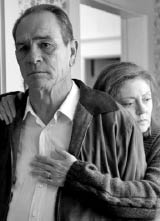Waging War on the Home Front: In the Valley of Elah
by George Sax

Just after the preview screening of In the Valley of Elah was over, I sat in my car outside the theater listening to a radio broadcast of the last half of President Bush’s latest restatement of his illusory strategy for triumph in his Iraq adventure. It was a sharp reminder of the political circumstances that contribute to events like those Paul Haggis’ film depicts. The president purported to address the state of the war’s prosecution. Haggis has focused on some of its human costs back in this country.
Elah—whose biblically derived title isn’t very apt—takes off from a 2003 murder of a soldier in Columbus, Georgia, near Fort Benning. Playing with the available facts of that case, Haggis has produced what is obviously intended to be a searing examination of the war’s degrading and corrupting effects on the young men who have been sent to fight it.
At Elah’s center is Hank Deerfield (Tommy Lee Jones), a retired Army sergeant and M.P. living in a small Tennessee town who receives a phone call telling him his son, just returned from a tour in Iraq, is AWOL from his base in New Mexico. Hank leaves his wife (Susan Sarandon) and drives his pickup to Fort Rudd to get more information than close-mouthed Army representatives have given him.
Already, in the picture’s first minutes, Hank’s deep-dyed patriotism and ruggedly independent character have been indicated. On his way out of town, he stops to instruct a foreign-born school custodian on how to raise the American flag properly. The trip itself is apparently in line with his press-ahead approach to life.
When his son’s gruesome murder is discovered, Hank stubbornly undertakes his own investigation in the face of careless errors by the Army and the local police, who wrangle (unconvincingly) over jurisdiction. He prods an initially reluctant local police detective (Charlize Theron), who becomes more aggressively engaged as she encounters the military investigators’ uncooperative responses.
Elah’s twist-turning course is interrupted periodically as Hank obsessively studies grainy, jumpy, but increasingly disturbing video retrieved from his son’s cell phone, imagery that hints at things that aren’t in accord with what his son’s buddies relate about their experiences with him overseas and stateside. Elah soon develops a tension between its police-procedural story line and a potent, intensifying subtext. This isn’t a problem, in principle. This kind of opposition can be interesting. But Haggis, who wrote as well as directed the film, has created other problems for himself, and for us. He obviously wanted his film to tackle some very troubling, even tragic material and ideas. In a sense, Elah is intended to portray an American tragedy, but the way Haggis has chosen to draw his characters and tell this story doesn’t always serve his ambition well enough.
Hank is so rigidly stoic in the face of devastating events, so resourceful and insightful an investigator, that the character begins to bump up against credulity. We might be willing to overlook this because Jones is one of the few prominent film actors who can make this kind of material seem more complex and credible. He brings something like an economical eloquence to the role. Jones imbues Hank with a gravity, and signals a barely contained anguish.
But Haggis is sometimes not up to his star’s powerful simplicity. He hasn’t resorted to the thumping didacticism and patronizing ironies he employed in his Oscar-winning Crash, but Elah isn’t free of too easy point-making. His film becomes a little too much like a political and psychological mashup. Haggis has overdrawn and overdetermined.
And yet it’s hard to dismiss the film’s effect. It has its crudities, but it also honestly strains to convey an unsettling sense that we aren’t really aware enough of the brutalizing impact of the war on many of the Americans serving in Iraq. Elah retains a disquieting power in spite of its more ill-advised elements.
|
Issue Navigation> Issue Index > v6n38: About Face (9/20/07) > Waging War on the Home Front: In the Valley of Elah This Week's Issue • Artvoice Daily • Artvoice TV • Events Calendar • Classifieds |









 Current Issue
Current Issue